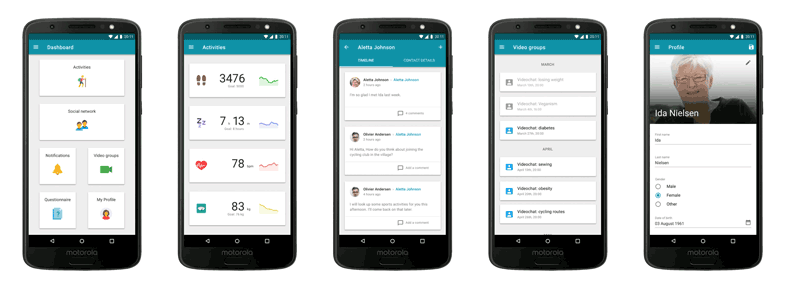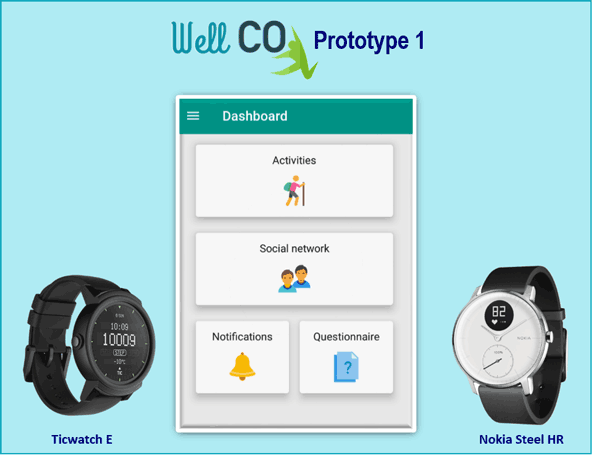by Vlad Manea (University of Copenhagen) and Katarzyna Wac (University of Copenhagen and University of Geneva)
WellCo is a European H2020 project that aims to design and evaluate an engaging virtual coach to help older adults make positive behavioural choices that benefit their long-term health, wellbeing, and quality of life in physical, psychological and social interaction domains.
Populations are growing, and the average human lifespan is increasing. Poor lifestyle choices may develop over a long period, resulting in chronic disease such as cardiovascular disease or diabetes later in life [1]. At the same time, ever-sophisticated wearable activity trackers and mobile applications enable the assessment of the individual’s daily habits and risk factors which impact their long-term health.
The WellCo European H2020 project (2017-2021), delivers a radical new information and communication technologies (ICT) based solution in the provision of personalised advice, guidance, and follow-up for its users. Its goal is to encourage people to adopt healthier habits that help them maintain or improve their physical, cognitive, mental, and social well-being for as long as possible. Advice is given through behaviour change interventions tailored explicitly to each user. These interventions range from setting social goals to recommending activities around the seven areas defined in WellCo: cognitive stimulation, leisure and entertainment, supporting groups, physical activity, health status, nutrition, and tips (Figure 1). The behaviour change concept leverages the Behaviour Change Wheel model [2].

Figure 1: Prototype of the WellCo mobile application with information about activities, social network, video conversations, and user profile.
WellCo provides recommendations and goals after assessing the user’s probability of experiencing particular diseases. This assessment takes into account the user’s profile, context, socio-economic status, health, and mental state. These characteristics are derived from data obtained from the user’s activities of daily life (ADL) in which wearable sensors are seamlessly integrated (Figure 2), as well as from the user’s mood, leveraging affective computing via visual and speech emotion recognition.

Figure 2: WellCo dashboard and two models of wearable device compatible with WellCo.
The virtual coach developed in WellCo provides guidance and follow-up. It is an affective-aware and always active service. The coach interacts through speech with the user to: 1) act as the virtual interface between the user and the platform (managing the flow of all user-platform and platform-user interactions, and: 2) empower users in the behaviour change process (through stimulation activities tailored to their current mood). A multidisciplinary team of experts, as well as the user’s caregivers, continuously support the service. They provide their clinical evidence (expert-related outcomes) and personal knowledge about the user and the user’s behaviours (observer-related outcomes) [3] to ensure the effectiveness and accuracy of the interventions.
The main technology-driven innovation of the WellCo solution is the health risk awareness tool. It assesses the risks of an individual with particular preconditions (e.g. family history) or behavioural patterns (e.g. smoking) leading to the development of chronic diseases, such as cardiovascular disease or diabetes. The risk awareness tool also uses behaviour and risk patterns extracted from the individual’s electronic health records (EHR). The theoretical foundations for the risk awareness tool are derived from the state of the art in preventive medicine. These are meta-analysis-driven, focusing on evidence-based disease risk models, including recent epidemiological findings. The output of the risk awareness tool includes: 1) relative risk, 2) modifiable risk (the risk that can be altered by behaviour), and 3) absolute risk (the probability of a given disease expression). The application of the risk awareness tool is vital in providing the individual, via the virtual coach, different future “if-else” scenarios for modifiable risks (Figure 3). They quantify how the user’s health risk changes in response to changes in lifestyle.
WellCo is based on a co-design process where end-users play a crucial role. This means that end-users are involved right from the project’s conception, and contribute at every step of the prototype’s development, starting with a mock-up development, via an initial proof of concept with the users, and continuing with three incremental prototypes to ensure a valid and effective service integration and validation.
The expected outcomes of WellCo may be categorised as short-term (feeling motivated to change one’s habits), intermediate (e.g. changing attitudes, norms and behaviours; translating good intentions into practical actions), and long-term (initiating and maintaining positive habits, changing activities and improving health status and quality of life over the long term). To demonstrate the health behaviour change process, long-term trials have just started (mid-2019) in several European countries, including Italy, Spain, and Denmark, with the participation of public health and social care organisations (Italy and Spain) and research organisations (Denmark).
The project involves eight European partners: HI-Iberia (Spain, the coordinator), Fondazione Bruno Kessler (Italy), Institut Jozef Stefan (Slovenia), Gerencia de Servicios Sociales de Castilla y León (Spain), ConnectedCare Services B.V. (The Netherlands), Monsenso (Denmark), Syddansk Universitet (Denmark), and Københavns Universitet (Denmark).
Links:
[L1] http://wellco-project.eu/
[L2] http://qualityoflifetechnologies.org
References:
[1] M. Naghavi et al.: “Global, regional, and national age-sex specific mortality for 264 causes of death, 1980–2016: a systematic analysis for the Global Burden of Disease Study 2016,” Lancet, vol. 390, no. 10100, pp. 1151–1210, Sep. 2017.
[2] S. Michie, M. M. van Stralen, and R. West: “The behaviour change wheel: A new method for characterising and designing behaviour change interventions,” Implement. Sci., vol. 6, no. 1, p. 42, Dec. 2011.
[3] N. E. Mayo, et al.: “Montreal Accord on patient-reported outcomes use series—paper 2: terminology proposed to measure what matters in health,” J. Clin. Epidemiol., Apr. 2017.
Please contact:
Vlad Manea, QoL Lab, University of Copenhagen, Denmark










